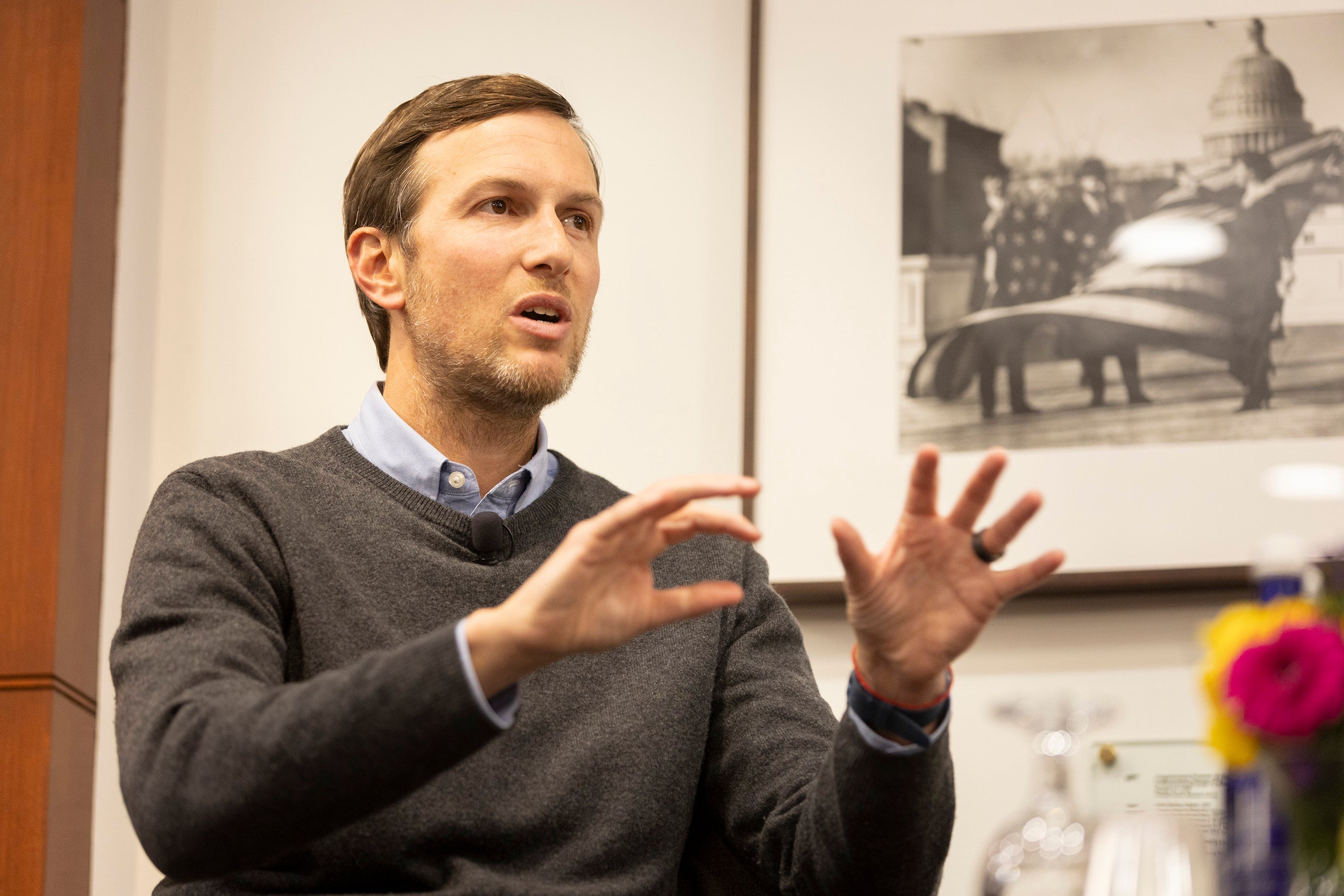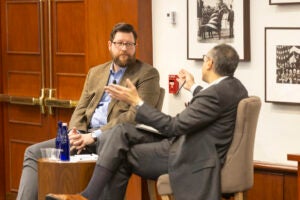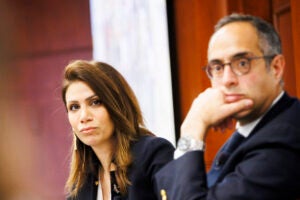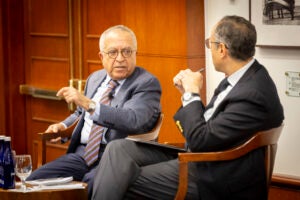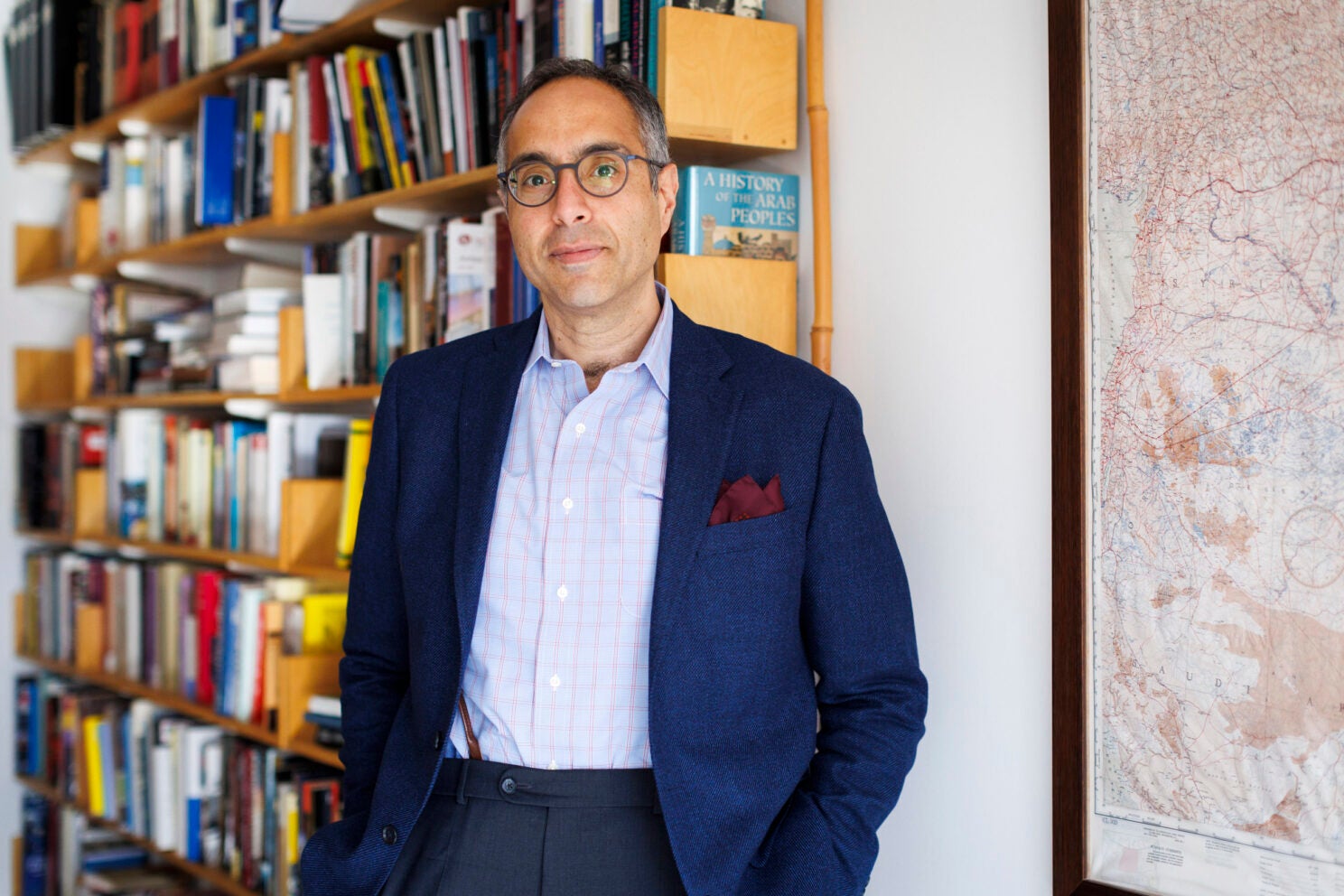
Stephanie Mitchell/Harvard Staff Photographer
Speaking to the moment
Tarek Masoud wanted to show that Harvard could confront tensions around Israel-Gaza without vitriol or shouting. So far, it’s worked.
It’s not enough to talk about having difficult conversations about difficult subjects; scholars and students have to persist when things get uncomfortable. That’s been the guiding principle behind Middle East Dialogues, a series of Kennedy School events focused on the Israel-Hamas war that began in the wake of the Oct. 7 terror attack on Israel.
Organized by Tarek Masoud, Ford Foundation Professor of Democracy and Governance and faculty director of the Middle East Initiative at Harvard Kennedy School, the series hosts Israeli, Palestinian, and American scholars, activists, and political figures sharing different viewpoints on a conflict that has fueled tensions on campus and around the world. Masoud’s choice of guests, including former Trump adviser Jared Kushner and controversial Palestinian scholar Dalal Saeb Iriqat, has drawn criticism from some.
The Gazette sat down with Masoud to talk about his intentions for the series and the debate it has stirred on and off campus. The interview has been edited for clarity and length.
When you launched the Middle East Dialogues, you said you wanted to give the Harvard community an opportunity to hear from and engage with people who have different views, experiences, and expertise on the Israel-Hamas war. How do you think it’s going?
I would cautiously say that it has been going reasonably well. Our events have drawn large audiences that are quite diverse with respect to their views on what’s happening in Israel and Gaza and the broader Middle East, and they have asked our speakers smart, incisive questions. Though there has been opposition to some of the participants and their views, and I certainly could have done some things better, I think that even people who really strongly disagreed with a given speaker felt that they had the opportunity to hear the speaker’s views tested.
More from Middle East Dialogues
What kind of feedback have you received from students and colleagues so far?
The feedback has been largely supportive and positive within the University. People at Harvard understand that this is the kind of thing we have to do. If we can’t have a conversation about what’s happening in the Middle East with a professor from Ramallah, or with a former Israeli parliamentarian, or with a former Middle East policymaker from the Trump administration, or with one of Bernie Sanders’ foreign policy advisers, then we’re not really doing our job. There would be something deeply wrong with an institution that could not convene those kinds of conversations.
I’m pleased to say that there isn’t anything deeply wrong with Harvard. We’ve been having those conversations. Our students and my colleagues have been complete adults about it. Even people from outside the University, such as those who voiced objections to my hosting a Palestinian speaker who blamed Israel for the terrorist attacks of Oct. 7, would generally come around when I would meet with them and explain what I was trying to do. There has been a real appreciation of this effort, a real recognition of the breadth of views that I’m trying to bring to this campus and of the rigor with which we’re trying to conduct each one of these encounters so that it is not simply the platforming of this or that view, but really modeling how we, as an intellectual community, should engage with important perspectives in very high-stakes public policy debates.
Have you been surprised by the responses the conversations have generated?
I have always had much more faith in the Harvard community than the media has. So even though people in the broader world might have a caricature of Harvard as a place where anybody who articulates a difficult position is immediately shouted down by this or that group of unruly students, the reality of my experience over the last 15 years here has been that that’s not the case, particularly at the Kennedy School. I never had a tremendous amount of fear that these events were going to devolve into chaos and recriminations. Some of the media coverage around my Palestinian guest was so intense that it certainly gave me pause. But in the end, that event, like the other two events, was fairly orderly. She and I certainly had a rigorous and frank exchange of views, and many people were understandably unhappy with what she said, just as there were many who supported her perspective. But it was good for everybody to hear a real conversation about the core issues at stake.
So, were you caught off guard by the criticisms of Jared Kushner and Dalal Saeb Iriqat?
I had thought that I would receive some pushback with respect to my invitation to Kushner, but it had not occurred to me that Iriqat would generate a negative backlash, in part because I had not seen the social media posts that were so inflammatory. I have certainly second-guessed myself a lot throughout this process. But in the end, I think the exchanges have been educational. People came away from the session with Kushner understanding what Middle East policy in a Trump administration might look like, and they came away from the session with Iriqat understanding a perspective that one has to understand if one wants to speak intelligently about the prospects for a negotiated settlement between Israelis and Palestinians.
Yes, both of them said things that make people angry. I don’t think we as an institution should be necessarily surprised or shocked that people become agitated around this issue. We’re talking about an issue that people experience viscerally, and we’re trying to get them to experience it cerebrally. Sometimes that’s hard. But I hope that our events have modeled for people how that can be done.
Are students sufficiently informed about the long, complicated history and the full political, legal, and religious dimensions of this conflict? Some have been criticized for applying a binary frame to the situation.
I don’t know that the two things are contradictory to each other. There are people who are deeply informed about the conflict who see it through the lens of oppressor and oppressed, and there are people who are deeply informed about the conflict who do not see it that way at all. If a student comes to one of my events believing in a simple binary about Israel-Palestine, and then leaves having their simple binary challenged, that’s great. If they leave still holding to their simple binary but they’ve now been exposed to some potent arguments on the other side, and so consequently they reframe their position or they come to better arguments for their position and a fuller understanding of why they believe what they believe, that’s fine too. People are going to hold very strong positions. What I want is for my students who have strong positions to actually know why they hold them and to have those positions be subject to the most rigorous test possible, such that if they realize that their position was wrong, they change it.
What’s lacking in the current discussion about this war?
What’s really lacking is empathy. I’ve been very saddened by the inability of many people on each side to empathize with suffering on the other side. Whether that is Palestinians who quite understandably center their own suffering over the suffering that happened on Oct. 7, or Israelis whose grief over Oct. 7 quite understandably prevents them from acknowledging suffering that’s happening in Gaza right now. Part of that is natural: It is very hard to empathize with those with whom you’re in conflict. But I hope these conversations can help create space for some of that empathy. Because, if there were a lot more empathy on each side, we’d be a lot closer to getting peace and the coexistence that these two groups deserve.
What’s next? Do you have any plans to continue the series after this semester?
I need a vacation (laughs). I have the former Palestinian Prime Minister Salam Fayyad coming up (Tuesday, March 26) and then former Israeli parliamentarian Einat Wilf (April 12). We’re wrapping up the series with Bret Stephens of The New York Times (April 29).
When all of that is in the rearview mirror, I will sit down with my team and think about what we will do next year. The engagement generated by our events on and off campus suggests to me that this is a good thing to continue doing. It’s difficult and stressful and we don’t always get it right, but it is a fulfillment of our educational mission both within and outside the walls of the University. And maybe other colleagues will adopt this model to have conversations about the difficult issues that they study.



